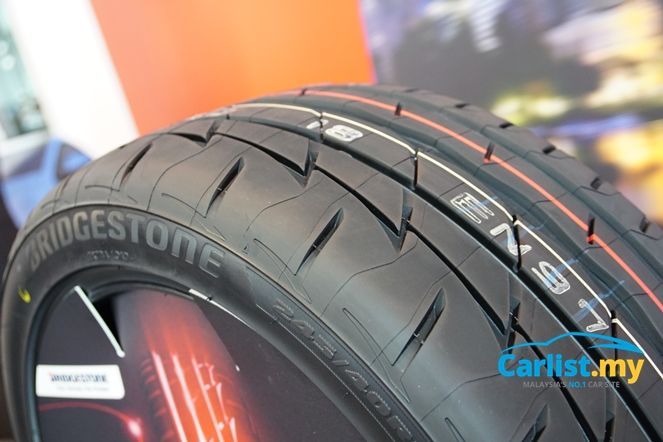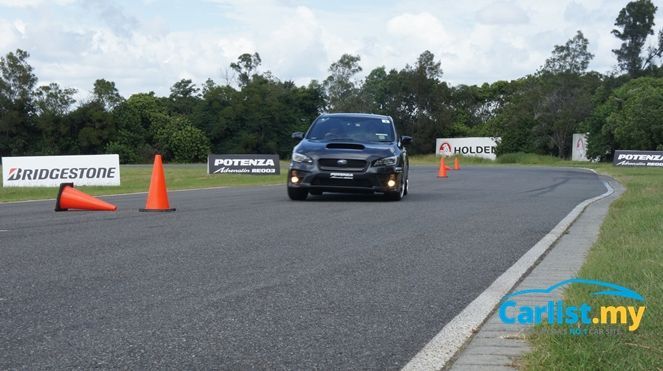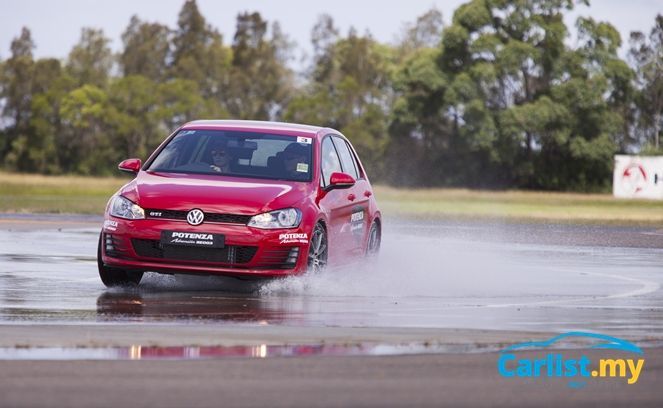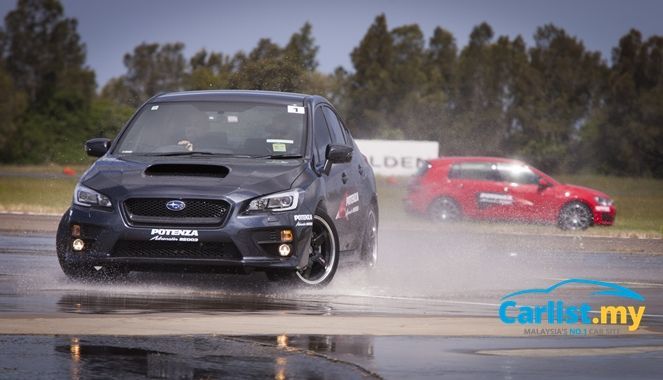Testing Bridgestone's Latest Working Class Hero - Potenza RE003
ReviewsYou know Bridgestone has a winning product on its hands when it is confident enough to pass us the keys to various pairs of identical cars but fitted with tyres from renowned competitors like Goodyear and Michelin.
The subject of my attention today is the Bridgestone Potenza Adrenalin RE003. As its Potenza name suggests, this is a street performance tyre. It replaces the previous RE002 and is positioned below Bridgestone's performance flagship the Potenza S001. For trivia lovers, RE is short for Racing Equipment.
Where the Potenza S001 is aimed at top-level performance cars (think Ferrari 458 and Porsche 911), the RE003 is aimed at mid-level performance cars like the Volkswagen Golf GTI, Toyota 86, Subaru WRX and Mitsubishi Lancer Evolution.
What's New?

Compared to the previous RE002, the new RE003 sports a far more aggressive tread pattern, with the asymmetrical tyre's outer side tread looking almost like a racing specs semi-slick tyre!
As you would expect from incorporating a semi-slick style groove, the RE003's improvement in dry handling performance was immediately obvious when compared against the RE002 back-to-back in two identical Subaru WRXes – more on that later.
Bridgestone says the 'Connection Block' - its marketing name for the semi-slick looking bits - adds rigidity to the outer side of the tyre, thus resisting deformation during high-speed cornering, further improving its stability in dry cornering.
But this is not a one-hit wonder tyre, as an equal amount of attention was also given in improving wet weather performance.
Running along the centre rib is a squiggly worm-like tread pattern which Bridgestone calls 'Pulse Groove.'
Pulse Groove's task is to facilitate fast drainage of water to prevent hydroplanning - a situation where the tyre's rotational speed is faster than the grooves' ability to disperse water, thus causing the tyre to float like it's a child's swimming float.
The tyre is also made with a new type of silica compound, featuring Bridgestone's proprietary NanoPro Tech technology. Silica is commonly used to improve a tyre's energy efficiency but in this case, Bridgestone says it also improves dry and wet handling.

Overall, Bridgestone says the RE003 is better than the previous RE002 by six percent in terms of cornering stiffness, eight percent in cornering force threshold - thus allowing the tyre to hold on to the driver's intended line in a corner better - a claim which we will put to the test later.
In terms of the all important braking distance, RE003 is five percent better than the RE002, in both wet and dry conditions.
But the biggest improvement was in the subjective aspect of 'centre feel,' which Bridgestone reckons is 20 percent better than before.
How Does It Drive?

The tests were conducted at the Holden Proving Ground in Brisbane, Australia, one of the three locations in the world to have a rotating turntable, whose giant spinning plate will spit out any car driven over it sideways to simulate a skid at high speeds.
The first test is a fairly mild exercise, comparing against the RE003's predecessor in two identical Subaru WRXes along a slalom course.
Comparing the two back-to-back, the difference in feedback is quite startling, something which I initially refused to believe, short of any instrumented testing, and placed it down to some placebo effect.
How is it possible that one generation of tyre development can deliver any noticeable improvement in a short subjective test? Apparently it is possible.
But repeated test runs confirmed my initial experience - the RE003 sends out a more precise yet progressive feel, whether it is driving straight ahead or see-sawing the steering wheel negotiating the slalom.
With speedometer kept at 55 km/h, the RE003's improved handling is immediate from the moment I turned the wheel to aim for the first cone in the slalom. Where the RE002 feels more vague despite gripping well, the RE003 adds a greater sense of linearity to its action, allowing you as the driver to have a greater degree of feedback from the front tyres.
The next exercise was more interesting. Two Volkswagen Golf GTIs were parked just outside a wet skid pad - one shod with Goodyear Direction 5s and another with Bridgestone RE003s.

I set out with the Goodyear equipped GTI first, with the traction and stability control switched off. Circling the huge skidpad which is now more like a water-filled mega large dinner plate, I am reminded that Goodyear's strong reputation for wet handling isn't without substance.
Holding the steering wheel turned towards right, with the speedometer needle climbing slowly as I gradually build up speed to ascertain where the Goodyear's limits lies, the Goodyears hung on like it had claws dug deep into the standing water.
Understeer only starts to creep in from 50 km/h onwards, and by 55 km/h, the nose will start to push wide. But I also found that if you are steady enough to catch and correct the slide, it is possible to creep up to nearly 60 km/h but by then you are really dancing on the knife's edge. Once past the tyre's limits, the Goodyears broke free very quickly and very abruptly.
With the Bridgestones, the GTI held its line just as well, but there's noticeably more confidence permeating through the steering wheel. Objectively, there is little difference between the two in terms of the maximum speed that can be sustained, but where the Goodyear starting feeling skittish at 50 km/h, the Bridgestone felt calmer, even when the car starts to understeer hard.
Thanks to greater feedback coming through the steering wheel, the Bridgestone equipped car gives ample warning to the driver that he is approaching the limits.
Where the Goodyear went skittish, the Bridgestone simply understeered gently, with the slide becoming progressively wider as you get closer to its limits, but it never throws you off in an alarmingly quick manner.

Next up is the most exciting part of the test - the turn table - imagine a spinning disc on the road surface that you're supposed to drive across. Due to the proximity of the turn table with several trees, Bridgestone elected to have professional test drivers to show us instead. So it's a taxi ride in skidding car then.
Spinning at a leisurely 17 turns per minute, the turn table doesn't look intimidating at all, until you start driving across one.
Approaching the turn table straight ahead at 70 km/h in an all-wheel drive Subaru WRX, the spinning turntable caught the WRX's front wheels, hooked it up and spun it towards the left while the rear tyres were still gripping to the tarmac, violently pulling it into the spinning disc like the car has been caught up by a typhoon.
A fraction of a second later, the turn table spit out the WRX while the rear was yet to catch up with what's happening.
The result is a very violent skid as the front and rear tyres lost grip, and then gripped again, but with both ends wanting to go at different directions. It took a full opposite lock and generous use of throttle before the car could be controlled again.
The immediacy of the RE003s in clawing the wet surface for grip from the moment it left the turntable, arresting the skid as if a huge anchor was just thrown out the window, was enough to rock us sitting inside the car from one side to another.
The final test was the all-round course, which involves a longer stretch of road, interspaced with slaloms and fast lane changes to simulate everyday driving conditions. Once again, two Subaru WRXes were used.
This time the benchmark tyre used was Michelin's Pilot Sport 3 (PS3), probably the best all-round capability tyre on the market.
Driving down the straights, the RE003 was noticeably quieter than the PS3, and had better centre feel when driving straight.
Heaving the steering wheel left-right for the slaloms, the RE003s matched the outstanding precision of the PS3s but the RE003 appears to resist sidewall deformation better than the PS3, and required less correction to the steering angle.
But the test was too brief, focusing only on a narrow set of performance attributes to conclude that the Bridgestone was better than the Michelin, which I still hold in very high regard.
In another tyre test that I have experienced two years ago, pitting Michelins against Bridgestones, I realized that as the temperature increased, Bridgestone's performance proved to be less consistent than Michelin's, whose Total Performance System technology has been proven to deliver a more consistent performance, across all performance attributes.
Still, the RE003 is sold at a considerably cheaper price than Michelin's equivalent so the trade-off is acceptable. Overall, I would definitely recommend the RE003 to anyone looking for an affordable street performance tyre.
The Bridgestone RE003 is available in 15-inch until 18-inch sizes. Prices start from RM230 excluding GST.